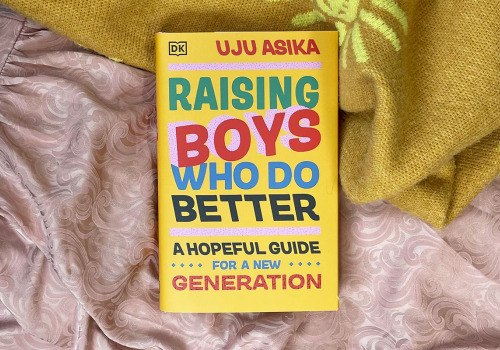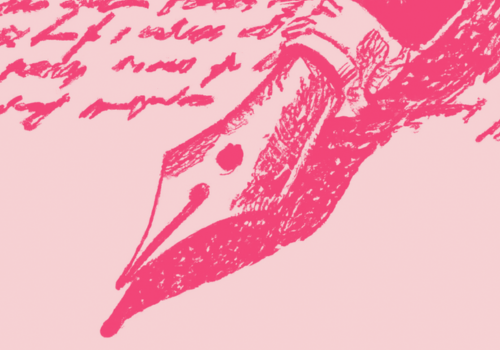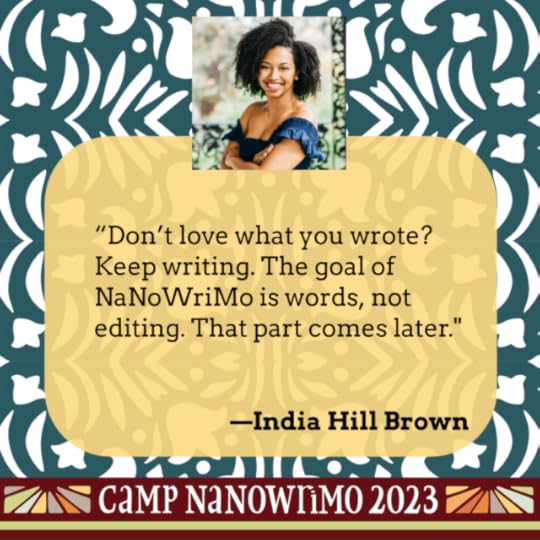Chris Baty's Blog, page 8
August 4, 2023
“Love the fact that you love stories, that you want to tell them, and honor the messy parts of the…

“Love the fact that you love stories, that you want to tell them, and honor the messy parts of the process.“
— Prince Shakur is a radical, multi-medium artist, organizer, and educator whose work centers on deepening black histories through queer, black, and liberatory lens. His journalism and essays have appeared in Teen Vogue, AfroPunk, The Cut, and beyond on the dangerous systemic and personal impacts of the carceral system, demanding complex truths about black political and creative icons, and gender politics in film. His visual work spans two Youtube channels: the award-winning travel and documentary series, Two Woke Minds, a channel dedicated to debunking the black writer/travel life, and a forthcoming short film.
Check out Prince on Twitter, Instagram, Youtube , and Spotify!
Read more camp care packages here!

“Love the fact that you love stories, that you want to tell them, and honor the messy parts of the process.“
— Prince Shakur is a radical, multi-medium artist, organizer, and educator whose work centers on deepening black histories through queer, black, and liberatory lens. His journalism and essays have appeared in Teen Vogue, AfroPunk, The Cut, and beyond on the dangerous systemic and personal impacts of the carceral system, demanding complex truths about black political and creative icons, and gender politics in film. His visual work spans two Youtube channels: the award-winning travel and documentary series, Two Woke Minds, a channel dedicated to debunking the black writer/travel life, and a forthcoming short film.
Check out Prince on Twitter, Instagram, Youtube , and Spotify!
August 3, 2023
How to Write Through Second Book Syndrome

Second Book Syndrome is a unique experience that can affect any writer. Today, author Uju Asika talks about what she learned while tackling Second Book Syndrome and gives advice on navigating it.
There’s something immensely powerful about completing your first book. For a brief moment, you feel invincible. After all, pretty much everyone you meet thinks they have a book in them, but not many people actually sit down to write it.
I wrote my first book, Bringing Up Race, in the midst of a global pandemic. Writing my next book, a picture book for younger readers, was a much less stressful experience. So it was actually with my third book, aimed at grownups again, that Second Book Syndrome kicked in.
You’ve probably heard of sophomore album syndrome (see Lauryn Hill, The Stone Roses) aka the sophomore slump that, apparently, can happen to anyone from athletes to second year college students.
Second Book Syndrome isn’t talked about as much and yet it affects almost every author on some level. Whether you’re a million-copy seller, a mid-list author or a relative newbie, you grapple with the same insecurities and nightmare scenarios. How do I write something as good as or better than my last book? If my first book did well, was it just a fluke? If my first book sold poorly, is this book my last shot? Will it meet my readers’ expectations or am I going to get troll-bombed on Goodreads? Am I establishing an author brand or have I niched myself into a corner? Can I experiment with voice or will I get laughed at by critics? Do I even have it in me to write a WHOLE OTHER BOOK?
Now that you’ve finished at least one book, you might feel like you’ve got this shit nailed. But the tricky thing about writing is that every time you open a blank page, you are starting from scratch. And every time you face a blank page, you are forced to meet yourself there, again and again. No matter whether you’re writing fiction or nonfiction. There’s no escaping yourself and that’s what makes it so hard, so vulnerable and potentially, so transformative.
My latest book, Raising Boys Who Do Better: A Hopeful Guide for a New Generation, came out last month. Foolishly, I had it in the back of my mind that writing this book would be a relative breeze. In some ways, it was harder. I had so much Resistance — the negative force that pushes back when you try to do something that matters, as Steve Pressfield talks about in The War of Art.
I also had to deal with the impostor syndrome (a close cousin of Second Book Syndrome) that whispered in my ear that I didn’t have another book in me. That I had used up all my smart ideas and pretty words. That I should stick to short form content and leave the real writing to the professionals.
So how did I get over this? What can you do when you’re in the throes of Second Book Syndrome and feeling like you’ll never write another sentence again? Here are a few things that helped me:
Make a PlanIf you identify as a ‘pantser’ rather than a ‘plotter’, you’re probably shaking your head at this. But it doesn’t have to be a full proposal or outline. Your plan can be as simple as a journal entry, a short mission statement, a sentence describing your premise, or a note to self about what you’d like your reader to learn, feel and experience. Making a plan and reviewing it from time to time can help keep your project alive when you’re suffering from self-doubt, comparisonitis and other symptoms of Second Book Syndrome.
Give Yourself PermissionThe only way to release yourself from the pressure of writing your next book is to liberate yourself. Give yourself permission to write badly. I mean, really really badly. Permission to write something that sounds nothing like what you wrote before. Permission to play, to dream, to procrastinate. Permission to research until your head is bursting. For every project, I always keep a notebook so I can write by hand and make a mess and scribble pages of absolute drivel. I can spend hours writing around the edges of what I’m actually trying to explore. I encourage you to start every new project by writing yourself a permission slip. When you give yourself permission, the words might stick and splutter for a while but eventually, they flow. After that, the magic is in the edit.
Drown Out the NoiseWe’re surrounded by noise all day, from social media traffic to our own mental chatter to those Amazon reviews (gulp). It’s hugely distracting and can be a drain on your creativity and confidence. Look for ways to drown this out, whether that’s through meditation, writing retreats, long nature walks or journalling. My simplest trick is to put on some noise-cancelling headphones and turn the music up. This might sound counterintuitive but listening to music puts me in a headspace for writing without any filters. Also, as a mother who writes around her family life (the kitchen table is my office), I’ve used headphones for years to signal that I’m at work and to keep the cacophony of my kids at bay.
Get DrunkWhen you have another book to write, it’s easy to feel lost at the beginning. What to write and how to say it? When this happens, I immerse myself in storytelling. The poet Charles Baudelaire famously said one should ‘Always Be Drunk’ and it’s a quote that I live by. I don’t mean Hemingway-style binges, I mean being drunk on stories. I consume books, podcasts, films, TV shows, songs, art shows, conversations, eavesdropping, everyday life. I feed my habit and my habit feeds my writing.
Focus on What You Can ControlCreativity is mostly trial and error. Art is subjective and you can’t control how your work will be received by an audience or by critics. Often, success hinges on an indefinable mix of luck, talent, hard work, timing, money, network, reputation and… did I mention luck? Through all this, the only thing you can control is how you show up. I do my best to show up for my readers in a way that’s engaging, impactful and entertaining — both on the page and in real life. Other than that, the rest is not up to me. All I can do is keep showing up.
Track ChangesWhen you’re editing a piece of work, it can be helpful to track changes on a document. But this isn’t what I’m talking about here. What I mean is keeping track of the changes that happen because you had the courage to put your work into the world. I screenshot comments from readers on social media who tell me my books have changed the way they think about race and identity. I save a file of testimonials from parents who say I’ve shaped how they talk to their children about these tricky topics. I also keep notes on what I’ve learned and how I’ve grown while writing a book. All this is a reminder that so much of writing (and reading) isn’t just about the product or the story but about who we are becoming through the process.
Lean On Your PeopleProbably the most useful thing you can do as a writer is to find your people and lean on them. Obviously your closest friend/partner/family member who enjoys your writing or offers great advice can be invaluable. But as a writer, your people are other writers and it’s essential that you seek them out. Follow #writercommunity hashtags on social media, join a writers’ group or membership, befriend other newbie authors when your book comes out. You need to be in community with other writers who get it. Especially when Third Book Syndrome comes knocking…

NaNoWriMo Writers Board member Uju Asika is a multi-award nominated blogger, former journalist and TV screenwriter. She is the author of Bringing Up Race: How to Raise a Kind Child in a Prejudiced World and the picture book A World for Me and You (Where Everyone Is Welcome). Her new book Raising Boys Who Do Better: A Hopeful Guide for a New Generation came out on June 1. You can order the book for free worldwide delivery on Wordery: https://wordery.com/raising-boys-who-do-better-uju-asika-9780241608418
Uju is launching a creative writing service for developing and aspiring writers, learn more here !
July 31, 2023
“If you find yourself treading water, take comfort in the fact that you are neither the first writer…

“If you find yourself treading water, take comfort in the fact that you are neither the first writer nor the last to feel this way. Keep swimming.”
— Kelsey Norris is a writer and editor from Alabama. She earned an MFA from Vanderbilt University and has worked as a teacher in Namibia, a school librarian, and a bookseller. Her work has been published in The Kenyon Review, Black Warrior Review, and The Rumpus, among others. She is currently based in Washington, DC. Her debut story collection, House Gone Quiet, publishes October 17th, 2023, with Scribner Books, and is now available for pre-order at online retailers or your local bookstore.
Check out Kelsey on Twitter!
Read more camp care packages here!

“If you find yourself treading water, take comfort in the fact that you are neither the first writer nor the last to feel this way. Keep swimming.”
— Kelsey Norris is a writer and editor from Alabama. She earned an MFA from Vanderbilt University and has worked as a teacher in Namibia, a school librarian, and a bookseller. Her work has been published in The Kenyon Review, Black Warrior Review, and The Rumpus, among others. She is currently based in Washington, DC. Her debut story collection, House Gone Quiet, publishes October 17th, 2023, with Scribner Books, and is now available for pre-order at online retailers or your local bookstore.
Check out Kelsey on Twitter!
July 26, 2023
10 Tips for Developing a Daily Writing Practice

Every year, we’re lucky to have great sponsors for our nonprofit events. Scrivener, a 2023 Camp NaNoWriMo sponsor, is an award-winning writing app designed to help you get writing and keep writing. Here, Scrivener user and first time Camper, Bookstagrammer, aspiring author, and visual storyteller Yeldah Yousfi shares her tips on how to write consistently:
Writing consistently is one of the most important habits to cultivate if you want to become a better writer and reach your Camp NaNoWriMo target. However, while developing a habit of daily writing practice is useful for exercising your writing skills, it can be difficult to maintain.
Here are ten tips that I personally use for developing a habit of writing consistently every day:
1. Set a schedule.One of the most important steps to developing a consistent writing habit is to set a schedule. Set aside a specific time every day that you can dedicate to writing—even if you just try this during Camp. This will help you to make writing a routine part of your day, and it will also make it easier to stay motivated and avoid procrastination.
2. Create a writing space.It’s important to have a designated space that is comfortable and conducive to writing. This could be a home office, a library, or even a cafe. Whatever you choose, make sure it is comfortable and free of distractions so that you can focus on your writing.
3. Track your progress.Keeping track of your writing progress can help keep you motivated and on track. This could be as simple as making a checklist of goals for each day or tracking your word count so you can see how much you’ve written each day.
4. Set achievable goals.Having realistic goals is essential for staying motivated. It’s best to set smaller goals that are achievable in the short-term, such as writing 500 words a day, rather than trying to tackle a huge project all at once.
5. Take breaks.Taking breaks (no matter how short) can help you stay focused, energized, and allows for the mind to rest and to process the material that was just written. Taking a short break every two hours or so will help you to stay productive and prevent burnout. Walking outside always makes me feel better, and I find it helps generate more ideas.
6. Read, read, read.One of the best ways to become a better writer is to read, especially reading books in the genre you are writing in. Reading helps to open the mind to new ideas, concepts, and possibilities. You can also use the work of other authors to learn more about the craft of writing and to help you come up with ideas for your own work.
7. Don’t be afraid to make mistakes.Making mistakes is a part of the writing process. When you start writing, keep writing, even if it’s only for ten minutes. It probably won’t be perfect (or even good if it’s your first-time writing), but that’s okay—the more you write, the better you will become. Don’t be afraid to make mistakes and learn from them as you go.
8. Have a support system and a writing partner.Having a support system that you can reply on can be a great help in staying motivated and on track with your daily writing goals. This could be a friend or family member, or pick a Camp Counselor or writing group from the Camp forums. They can provide encouragement and help to keep you accountable. Additionally, having someone who is willing to read and give feedback on pieces of writing can be invaluable.
9. Reward yourself.Celebrate your successes and reward yourself for your progress. Whether it’s a special treat or just a pat on the back, make sure to recognize your achievements and reward yourself for reaching your goals.
10. Take it one step at a time.Writing is a process, and it takes time to develop a consistent writing habit. Don’t get discouraged if you don’t make progress right away. Just keep going and take it one step at a time.
Developing a consistent writing habit is essential for improving your writing skills and becoming a better writer. By following these ten tips, you can develop a habit of writing every day and make it a routine part of your life. Try it through July and see!
Yeldah Yousfi is a reader, aspiring author and visual storyteller. Check out Yeldah’s Instagram.
Top photo by Towfiqu barbhuiya on Unsplash.
July 25, 2023
How to Use Meal Scenes to Develop Characters, Relationships, and Your World

Worldbuilding can sound complicated, but why not make it a little more simple by focusing on food? It may be the domestic touch you need! NaNo Participant Lacey Pfalz talks about using meal scenes to develop your world and your characters.
There’s one thing that remains a universal human truth: we love food! While our perspectives on food might differ, people all across the globe gather together during mealtimes — and thus, mealtimes are made memorable.
Meal scenes can also help your story in a few key ways, especially if it’s fantasy, science fiction or historical fiction.
Meal Scenes for WorldbuildingIf we’re using food for worldbuilding purposes, does that mean we can say we’re worldcooking?
Just kidding! Worldbuilding, especially in historical fiction, science fiction, and fantasy, is an integral part of what you must do as a writer (In truth, it’s also important for writers from other genres, but we’re specializing in these three today).
Meal scenes can be an important part of the worldbuilding process. Food is intrinsically tied to a culture or a country, or even a small region. That’s why it’s important, when building your own world, to take time to figure out the bare minimum of what your characters will be eating.
Let’s do an example. Your world is fantasy, your kingdom set beside a wide river. Perhaps your capital city, where much of the action is located, is surrounded by wetland.
If this is the case, what types of food would likely grow there? Seafood, fished from the large river, might be your characters’ staple proteins, while rice might grow better than another grain because of your kingdom’s wetlands. Fruit, perhaps even coconuts, might be the sweet stuff your main character loves to devour.
Remember that your world directly affects what types of food your characters will be having: is there coffee in space? What about in Byzantine Turkey or your new riverside kingdom?
Shannon Chakraborty does a phenomenal job with this in her fantasy series The Daevabad Trilogy, which is set in the eighteenth century across the Middle East. Her first book, The City of Brass, is especially good at showcasing the often-fragrant dishes of the various cultures across this region of the world (some copies of the book even have a short list of recipes from the book that foodies can try whipping up for themselves).
While her book is set within the fantastical world of the Djinn, her food is based upon recipes that have been preserved for centuries.
There’s one small reminder with all of this: it’s important not to get too caught up in describing each dish so much that you end up taking the focus away from the characters in a meal scene. Meal scenes can be breaks from fast action, but they should also continue the plot.
Meal Scenes for Developing Characters & RelationshipsCharacter development can be hard, especially if you have a handful of characters that you love! But in order to make your readers love them too, you have to show them interacting with the world around them.
That guy we love to hate? Maybe he’s a loner who has grown up eating by himself. Having him forced to sit and eat with a group of people who have known each other for years might be an awkward moment for him, but it helps readers to learn more about his own worldview — and it might just help get him out of his shell, or at least off the love-to-hate list.
Besides helping you develop a single character, writing meal scenes with some of your characters can also help readers learn more about the relationship between your characters.
Let’s say you have your main character, MC. MC leans over and steals a French fry from her best friend. There’s no issue, right? That’s because they like each other, and the best friend has likely eaten with MC before, and knows she enjoys stealing food from other people’s plates.
But when MC tries it again, this time with the guy sitting next to her, he whacks her hand to stop her from stealing. This sparks an argument that seems, at least to everyone else watching it, pointless, but readers will know from the rest of the story that they’re the enemies-to-lovers trope. This argument is just one of many before they finally acknowledge their feelings towards one another.
See how that worked? A meal scene wasn’t useless; it pulled the story along by giving readers another taste of the enemies-to-lovers trope that so many enjoy reading.
If you need a more visible example of how this can play out, try watching a movie like Pride & Prejudice, (the book is amazing, but I’m suggesting the movie as a visual aid). The movie does a great job showcasing just how different the members of the Bennet family are individually, how they act around each other, and how they act around company.
There’s often little action in meal scenes, so they’re not meant to be overused. The plot should also still be there — take the cringey proposal scene between Mr. Collins and Elizabeth in Pride & Prejudice, for example, which follows directly after a meal when the rest of her family abandons her. In this case, the plot (and Mr. Collins’ advances) ruin her meal.
Perhaps your meal scene is the much-needed respite in between battling fierce aliens for planet Earth, or the first time your main character’s enemy-to-lover has entered her home. Either way, meal scenes are an important way to immerse your readers in what kind of world they’re imagining as well as showcasing how your characters act and — more importantly — how they act around each other.

Lacey Pfalz is a travel journalist by day, hopeful author by night. She belongs to the class of graduates she dubs the Class of COVID-19, having graduated with a double major in history and writing at Wisconsin Lutheran College in 2020.
Her writing passions include fantasy, science fiction and historical fiction (with a little bit of romance, of course!). As someone with a physical disability, it’s her dream to write a fantasy series featuring a main character like her.
Header Image by Jack Sparrow
July 21, 2023
5 Tips for Building a Sustainable Writing Practice

Every year, we’re lucky to have great sponsors for our nonprofit events. First Draft Pro, a 2023 Camp NaNoWriMo sponsor, is a great writing app—whether you’re writing solo or with a co-author. Here are a few tips for building a sustainable writing practice, brought to you by author Ariana Brown and First Draft Pro.
We’ve all heard the advice to “write every day,” as if it were that easy! Translation: suck it up, no one cares if you’re tired. But what if there was another way to get writing done, without being unkind to yourself?
Hi, I’m Ariana Brown, and I teach writers how to create a writing practice that is sustainable, flexible, and fulfilling. Most of my students are chronically ill, disabled, neurodivergent, or simply exhausted from the daily stresses of life. I know writing isn’t your only responsibility—capitalism makes sure of that! But I strongly believe that writing should be an enjoyable activity you look forward to.
Below I’ve compiled my top tips for exhausted writers who want to be kinder to themselves—and still get the work done.
1. Add pleasure to your writing routine.Sensory pleasures are neither frivolous nor are they only for children. They’re a crucial part of being alive! They give us something to look forward to when times are tough and we need motivation. Candles, soft blankets, cold beverages, mood lighting, dance breaks, yummy treats—whatever you choose, make sure it’s something you love. Paint your nails a fun color so you have something beautiful to look at while you’re typing away. Make a playlist of your favorite songs and after you finish a chapter, blast one song so loudly you have to get up and dance. Then, get back to writing. Remember, even for the most focused among us, pleasure is a better motivator than shame.
2. Be clear about your intentions.What brought you to writing in the first place? For some, it was the ability to escape into our imaginations. For others, it was the chance to finally express what we’d been holding inside. Identify your reason for writing, then ask yourself: Am I still enjoying this? Do I still feel connected to my reason for writing? If not, explore how you can strengthen your connection to your inner child’s reason for writing.
3. Work with your brain, not against it.If we know that everyone’s brain works differently, why do we force strict discipline and linear processes on ourselves? My advice: find or create a writing process that works for you. Maybe you love outlines; maybe you prefer to see where the words take you. Either way, make space for wandering, play, and discovery as you write. Take brain breaks. Doodle, map, dance, and draw when you get distracted. Body double with other writers, try new exercises and prompts to make the writing sing, and take plenty of breaks to stretch your body and talk to friends. We come to writing with our whole selves. Listen to your body, don’t shut it off.
4. Find a writing community.You don’t have to wait for a community to come to you! I offer co-writing sessions on Zoom four times a month for my Patreon supporters, but do what works for you. Attend local open mics as an audience member and cheer on your peers. Invite your best friends to your living room once a month for a two hour writing/crafting session. Or check your local library and bookstores for free workshops and author events. You don’t have to do this work alone.
5. Develop a gratitude practice.Finishing your draft is a huge accomplishment, but it’s not the only milestone to be celebrated. Consider creating opportunities to thank yourself throughout your writing practice. You’re doing an amazing and difficult thing. The fact that you keep showing up is worthy of celebration. Whether you decide to journal, rest, pray, meditate, or reward yourself, a little gratitude goes a long way.

Ariana Brown is a queer writer from San Antonio, TX, based in Houston. She is the author of We Are Owed (Grieveland, 2021) and Sana Sana (Game Over Books, 2020), and a national collegiate poetry slam champion. Ariana holds an MFA in Poetry, MS in Library and Information Science, and a BA in African Diaspora Studies and Mexican American Studies. She has been writing, teaching, and performing for over a decade. Follow her online @ArianaThePoet and www.arianabrown.com.
July 20, 2023
“Don’t love what you wrote? Keep writing. The goal of NaNoWriMo is words, not editing. That part…

“Don’t love what you wrote? Keep writing. The goal of NaNoWriMo is words, not editing. That part comes later.”
— India Hill Brown is an author with a passion for writing, reading, and all things literary. Her debut novel, The Forgotten Girl, has been nominated for an NAACP Image Award for Outstanding Literary Work in Youth/Teens and a 2020 ALSC Notable Children’s Book. She graduated from Claflin University with a Bachelor’s Degree in Mass Communications and with a Concentration in Print Journalism. In her spare time, she can be found curling up with a good book, a hot drink, and a snack. A self-proclaimed southern belle, she lives in the Carolinas with her husband and two sons.
Read more camp care packages here!

“Don’t love what you wrote? Keep writing. The goal of NaNoWriMo is words, not editing. That part comes later.”
— India Hill Brown is an author with a passion for writing, reading, and all things literary. Her debut novel, The Forgotten Girl, has been nominated for an NAACP Image Award for Outstanding Literary Work in Youth/Teens and a 2020 ALSC Notable Children’s Book. She graduated from Claflin University with a Bachelor’s Degree in Mass Communications and with a Concentration in Print Journalism. In her spare time, she can be found curling up with a good book, a hot drink, and a snack. A self-proclaimed southern belle, she lives in the Carolinas with her husband and two sons.
Chris Baty's Blog
- Chris Baty's profile
- 63 followers



